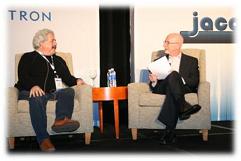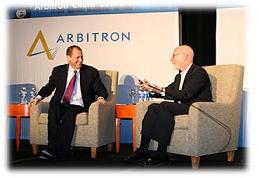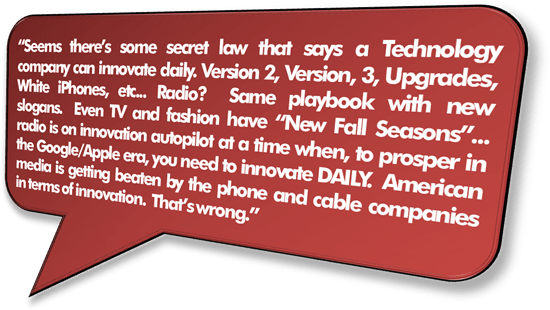I have a strong admiration for good thinkers – even if they’re people I compete against.
Over the years, we have welcomed fellow consultants to our Summit stage and/or have provided ample space in this blog for them to share their thoughts and accomplishments. This includes Alan Burns, then-consultant Mike McVay (who was one of the “Presidents of Radio”), and Randy Lane and Lorna Ozmon at a Jacobs Summit (“Morning Show Makeover”).
 But one of my favorite radio philosophers is one-time arch rival Lee Abrams. I never worked with Lee – only competed against him. But over the years, we have exchanged and shared thoughts and ideas. We invited him to our Summit in 2010 shortly after he departed from Tribune and he was a great guest.
But one of my favorite radio philosophers is one-time arch rival Lee Abrams. I never worked with Lee – only competed against him. But over the years, we have exchanged and shared thoughts and ideas. We invited him to our Summit in 2010 shortly after he departed from Tribune and he was a great guest.
I know there are some in radio who look at Lee as yesterday’s news, a guy who talks a good game, or even as someone whose contributions to radio were overblown.
I believe these conclusions about Lee are off-base, incorrect, and miss the mark. And to ignore what Lee is raving about today is to do so at your and your company’s peril.
Over the holidays, he emailed me one of those end-of-the-year pieces that he wrote for one of the industry trades. Several of his 2012 prognostications and observations were things that I’ve heard him intone before.
But one that he labeled “The Secret Conspiracy” zeroed in on the lack of innovation in radio – at a time when everyone else places a high priority on big ideas. Here’s how Lee stated it:
This observation stopped me because not only is Lee right, but that I simply don’t hear innovation being made a priority by many radio cluster managers or corporate titans.
It’s not that new ideas aren’t welcome because I believe that every broadcast CEO would love a great new idea if someone down the chain actually dreamed one up. But when innovation isn’t a priority, the chances of it happening are next to none.
At Apple, Google, Amazon, Pandora, Facebook, Zynga, and every other successful, modern company you can think of, employees and managers are being asked to constantly innovate – to imagine that next big thing – the difference maker, the game changer, the killer app that will revolutionize the business. Resources are directed to innovation, and it is a clear priority because of its importance to companies – and frankly, to our survival as a viable world leader.
It is not surprising that the idea for the eReader didn’t come from book publishers or book sellers like Barnes & Noble or Border’s. When companies cling to the status quo and are content to ride out their historical trajectories, their demise is only hastened by the lack of new thinking.
 The Consumer Electronics Association’s CEO, Gary Shapiro (pictured from Summit XV), wrote a book on the topic – Innovation Will Restore The American Dream. Many in the consumer electronics world are energized about the future because they realize the importance and value of new ideas, updated versions, and a better customer experience. As I leave CES today – besides my feet hurting – I can’t imagine a more vibrant, upbeat, and innovative convention. There is excitement, passion, and new ideas everywhere you go. On the shuttle bus, the monorail, over lunch, and sharing taxis, everyone’s reaching out and telling you what they’re working on.
The Consumer Electronics Association’s CEO, Gary Shapiro (pictured from Summit XV), wrote a book on the topic – Innovation Will Restore The American Dream. Many in the consumer electronics world are energized about the future because they realize the importance and value of new ideas, updated versions, and a better customer experience. As I leave CES today – besides my feet hurting – I can’t imagine a more vibrant, upbeat, and innovative convention. There is excitement, passion, and new ideas everywhere you go. On the shuttle bus, the monorail, over lunch, and sharing taxis, everyone’s reaching out and telling you what they’re working on.
Broadcast radio would do well to stop playing “D” and start focusing on motivating its employees corporately and at the station level to try new things, to experiment, to dream, and to innovate. At a time when new ideas are the currency that can jumpstart an industry or a platform, and when young people are looking to industries that are exciting and open to new thinking, a change of course for broadcasting would be welcome.
Thanks for the kick in the pants, Lee, and here’s hoping that you find that company, think tank, or organization that is truly open to innovation.
- A 2020 Lesson?It Could All Be Gone In A Flash - April 24, 2025
- How AI Can Give Radio Personalities More…PERSONALITY - April 23, 2025
- Can Radio Afford To Miss The Short Videos Boat? - April 22, 2025





Why innovate when you can just eliminate jobs? Innovation takes work, while downsizing takes an email and a couple of billable hours from legal.
One prominent CEO lauded himself publicly about how starting a Groupon clone in 2012 cemented his innovation and “in touch” stripes. Really?
Think about it, the big story in radio is pretty much always about which company is eliminating how many jobs. If I were on the board of a radio company, I would propose financially penalizing the top execs for making their numbers by firing any more people and reward them for doing so by any other means.
I hope radio will realize that they do have to innovate to survive. There are lots of innovators making deals with auto and home entertainment competing with radio now.
Game on guys!
Almost forgot. I’ve worked with Lee and he’s a good guy who keeps you honest while keeping it fun. Lots of companies could benefit from his insight and perspective.
Thanks for both comments, Bob. Juggling fiscal responsibility with R&D has been challenging for radio in the last decade. The layoffs and cutbacks have been sad, but not just about radio. The economy dictated a large portion of them. But even with existing staffs, is innovation a #1 priority? Good question, and hopefully, we’ll get more comments. Thanks also for the observations about Lee.
Innovation should be the #1 priority. But with innovation in media, a few questions always arise. How do we protect and profit from content? As a media consumer, I worry about the future and freedom of radio. With Clear Channel and now Cumulus, getting into the game with Iheart radio, I fear a dark road lays ahead. Streaming, podcasting were a great outlet for the little guy. Clear Channel and Cumulus are like the kudzu of radio, choking out the defenseless native species. We can still hope that a small start up can beat them at their game.
Even if you don’t like a company (or companies) and the way they program/do business, it’s a big industry with lots of options. Our post yesterday, “The Other 99%,” addresses some of the options. Thanks for writing, and hang in there.
Thanks Fred for sharing Lee’s insight and yes he is one of the better minds in Broadcasting, I worked with him and saw his forward looking thinking in progress. And Bob is point on, the corporate world should get bonus based on ideas that stimulate revenue through innovation in sales or programming and not by cutting the heart out of the staffs that can help accomplish those goals.And finally, Fred, your article as always is point on, I see it every day and yet the folks inside these companies don’t, not sure I understand why…someone said that when the middle management of radio is gone, we will get back to learning new skills to grow the radio business once again.
Thank you, Jim. Much appreciated. Change is challenging for all of us. By staying constructive and supportive, we are trying to make a small difference. Thanks for reading our blog.
I suggest you have a look at Clay Christensen’s books including Innovators Dilemna and why companies have trouble innovating. It might give you some insights. I saw Lee speak at the Conclave and he really makes you think.
Christensen is one bright guy – thanks for the heads-up, Dave. And thanks for reading the blog.